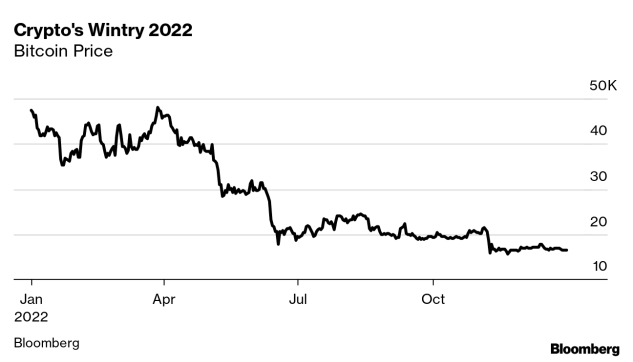What you should know about crypto this tax season after a tough 2022
Crypto had a turbulent year in 2022. High volatility and a drop in the value of major digital assets was followed by the fall of several major cryptocurrency firms, including FTX, Celsius, BlockFi and Voyager.
In the wake of these epic collapses, investors find themselves staring down their noses at a tax filing deadline, where losses abound, funds are frozen in bankrupt firms, and the IRS looks to regulate the crypto space more closely.
Amid the turmoil, tax practitioners say, the IRS has turned its focus to crypto investors and is seeking more information from taxpayers.
“If you’ve never put crypto reporting at the top of your mind, or front and center, I think this is the year,” said Joyce Beebe, a public finance fellow at Rice University’s Baker Institute.
Here’s what you should know about cryptocurrency this tax filing season:
Submission of 1040
US cryptocurrency holders have gained more certainty about how to report digital assets on Form 1040 income tax forms.
The IRS updated its 2022 form instructions in October, changing the wording from “virtual currency” to “digital assets,” a nod to the 2021 infrastructure bill that expanded cryptocurrency reporting requirements. The updated form explicitly states that digital assets include non-fungible tokens, or NFTs, and virtual currencies – clarifying a previous ambiguity.
“It’s actually very important because digital assets can include things like NFTs, which I’m not sure most taxpayers thought they had to report before,” said Sarah Paul, a partner at Eversheds Sutherland. “So it’s a big change.”
In August, the IRS expanded the yes-or-no question on the income form to specify whether a taxpayer received a digital asset as a “reward, prize or compensation.”
The yes-or-no question about virtual currency was moved to the front of Form 1040 in 2020 from the top of Schedule 1, where it was added in 2019.
There is no penalty for not checking “yes” on the 1040 form, but taxpayers who underreport their income may face penalties and interest on unreported crypto.
While the clarity was welcomed by tax professionals, guidance or law is what professionals say they want most.
Make a claim for capital loss
In the space of about six months last year, several cryptocurrency firms went bankrupt, starting with Voyager in July and ending with FTX in November. Amid the chaos, investors saw wide swings in the value of their coins. Prices of NFTs, many of them cartoon images of monkeys, reached dizzying heights before crashing late in the year.
Bitcoin started 2022 trading at nearly $42,000, and ended the year below $16,600. Ethereum started the year around $3,750 and ended around $1,200. FTX’s original token, FTT, dropped in value in early November; the prospects for recovery are uncertain.
“First of all, if you’re a crypto investor, you’re probably more likely than not to have a loss this year, because over the course of 2022, the value of cryptocurrency obviously dropped quite a bit,” Beebe said.
Beebe told Bloomberg Tax that frequent traders should keep track of their basis — what they paid for their coins — and reap the losses.
“Loss harvesting” refers to a method by which investors can reduce their overall tax liability by deducting losses to offset capital gains on other assets. Investors can deduct up to $3,000 of ordinary income on their federal taxes.
“A lot of people think, ‘Oh, I just had losses like I don’t need to record anything,” said Shehan Chandrasekera, head of tax strategy at CoinTracker. “Make sure you report them. It’s going to help you. It won’t hurt you.”
Capital gains and losses are recorded on form 8949, form D.
Crypto tied up in defunct exchanges
Investors with assets in now-defunct exchanges face a different set of challenges than those who have only suffered losses.
Most of the investments in bankrupt exchanges are currently frozen, and will remain so until the court case is settled. This means that investors cannot access their coins and sell them to realize capital losses.
And in some cases, taxpayers who lent assets to crypto firms like Celsius are still required to pay taxes on the interest they accrued in 2022, despite not having access to their money.
“For the 2022 tax year, unfortunately, it’s tough — you can’t do anything because the transaction hasn’t closed,” Chandrasekera said.
For now, tax experts say, it’s best to wait and see how things play out in court, because taxpayers may be able to recoup some of their value.
Chandrasekera said investors should keep thorough records of all their crypto transactions so they can determine the basis.
Wash-sale rules
When a stock or security is sold at a loss, the wash sale rule prevents taxpayers from buying it back within 30 days. The rule’s application to crypto remains a gray area.
The rule under Section 1091 does not currently apply to crypto. Mark DiMichael, a partner at Citrin Cooperman Advisors LLC, said he has seen many taxpayers do wash sales.
“The wash sale rules are old rules that they made many, many years ago and it was to prevent people from taking deductions,” DiMichael said. “But the way they wrote the rules, they didn’t write cryptocurrency as part of it, because it didn’t exist at the time.”
The House Ways and Means Committee proposed legislation in 2021 to bring digital assets under wash sale rules, signaling congressional interest in further regulating crypto. The bill ultimately stalled.
Looking forward
With the injection of $45.6 billion into the IRS for enforcement activities, tax experts expect to see increased scrutiny of the crypto space.
The IRS and Treasury are also working on formal rules to expand broker reporting requirements and the anti-money laundering rule from the Infrastructure Act of 2021. Those rules are not expected to affect this filing season or the average taxpayer, tax experts said.



